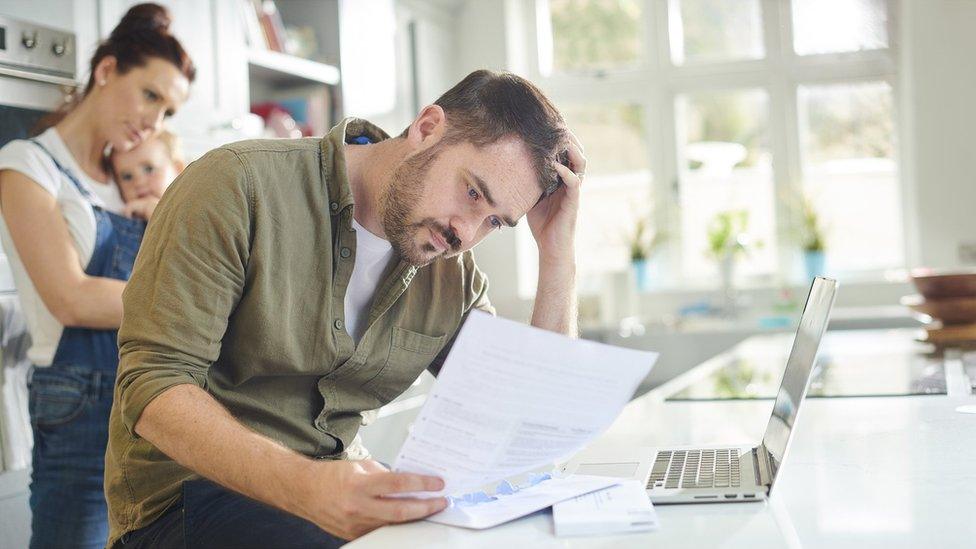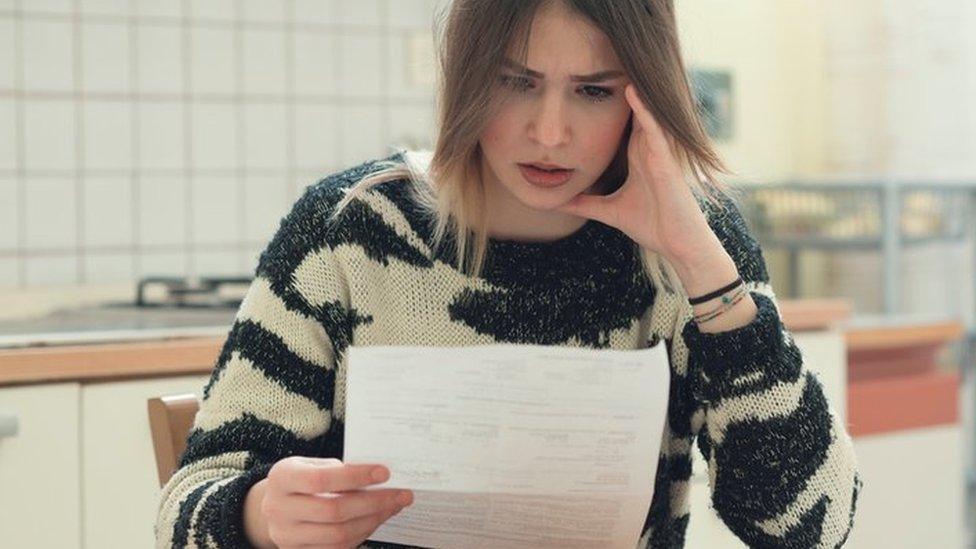Tax burden to rise by £3,000 per family, warns think tank
- Published
- comments

Measures introduced since Boris Johnson came to power, including Wednesday's Budget, will increase the UK's tax burden by £3,000 a year per household. according to the Resolution Foundation.
The think tank found policies announced by Chancellor Rishi Sunak had boosted incomes by 2.8% for the poorest fifth of households.
However, households on middle incomes would take a 2% hit, it added.
Mr Sunak said his Budget had "cut taxes for millions of the lowest-paid".
That claim was challenged by the Foundation's figures.
It said the changes to the amount families can keep from their earnings if they are on universal credit only partially offset the effect of withdrawing the £20-a-week boost during the pandemic.
On average, recipients would lose £800 a year, it calculated.
The £3,000 figure produced by the Resolution Foundation includes business taxes, which are regularly passed on to consumers.
Of the 4.4 million households on universal credit, about three-quarters (3.2 million households) will be worse off as a result of decisions to take away the £20-a week-uplift, despite the chancellor's new universal credit measures.
But 1.2 million households would be better off by £900 a year than before the Budget.
Responding to the Foundation's calculations, a Treasury spokesperson told the BBC: "It's misleading to imply that households will immediately face a £3,000 tax hit, because this figure appears to include business and employers' taxes which aren't applicable directly to households.
"The same report shows that the government's policies are set to boost incomes for those at the bottom of the distribution and that higher taxes will mostly impact middle-to-higher income households.
"This government's decisions have been worth nearly £500 per year extra to households on average, and more than £1,000 for the poorest households - and that's before factoring in wage growth, including the rise in the National Living Wage."
Talking on BBC Breakfast, Mr Sunak said pressures on the economy "will be with us for a while", but that the government's plan was working and "we can face the future with a bit more confidence".
He also said that wages were rising and that he had "cut taxes for millions of the lowest-paid people", adding that it was his job to be concerned about inflation and his new fiscal rules were "how we build up resilience".
Government figures show that when you take account of investment in public services, the average earner has seen improvements worth £500 a year overall.
Unprecedented crisis
Setting out the Budget on Wednesday, Mr Sunak said his plans were focused on the "post-Covid" era and would pave the way for an "economy of higher wages, higher skills, and rising productivity".
He told MPs the higher tax burden was down to the pandemic. "Taxes are rising to their highest level as a percentage of GDP since the 1950s - I don't like it, but I cannot apologise for it - it's the result of the unprecedented crisis," he said in his Budget speech.
He committed to spending increases of £150bn over three years, including nearly £2bn to help schools in England catch up following coronavirus, £6bn to tackle NHS backlogs and £7bn for transport projects.
He also announced that the universal credit "taper" rate would be cut by 8% no later than 1 December, so that instead of losing 63p of benefit for every £1 earned above the work allowance, the amount will be reduced to 55p.
Meanwhile, the National Living Wage will increase next year by 6.6%, to £9.50 an hour.
Labour's shadow chancellor, Rachel Reeves, welcomed the increases in spending announced by Mr Sunak, but said there were areas that gave her "cause for concern".
Highlighting the need for greater investment in education, she told BBC Radio 4's Today programme: "If we are going to grow the economy sustainably, we have got to invest in our young people.
"Unless we ensure that kids catch up from that missed-out education [during the pandemic], there will be a long-term cost to our economy."
Worse off
The Foundation's overnight analysis of the Budget and Spending Review 2021 revealed a deteriorating picture on family finances, with household incomes set to stagnate as a result of rising inflation.
"Higher taxes aren't a surprise, given the UK is combining fiscal conservatism with an ageing society and a slow-growing economy. But it is the end of low-tax conservatism, with the tax take rising by £3,000 per household by the middle of this decade," said Torsten Bell, chief executive of the Resolution Foundation.
With higher growth, inflation and public spending than previously expected, combined with tax rises already in train, the Foundation warns that the UK could be set for a flat recovery for household living standards.
The combined effect of universal credit changes, alcohol and fuel duties, higher council tax, income tax and national insurance delivered a 2.8% boost to the incomes of the poorest households.
But middle-income households will see incomes drop by 2% and the richest fifth of households will suffer a 3.1% hit by the middle of the decade, the Foundation warned.
Wages set to fall
In the wider population, wages are set to fall next year after inflation.
It means the last decade has been the weakest decade for pay growth since the 1930s.
By May 2024, real wages will have grown by just 2.4% since 2008 - compared with a 38% real wage increase between 1992 and 2008.
"The chancellor got some really good news for the public finances yesterday - lower borrowing, because the economy's doing slightly better than we all though six months ago. But good news for public finances wasn't good news for household finances," the Foundation's Mr Bell told BBC Breakfast.
"That's because higher inflation that actually helped the chancellor with his borrowing figures is obviously hurting household budgets, and that's why the Office for Budget Responsibility expects household incomes and wages to actually not grow at all in the next year.
"So that's going to be really bad news for everyone worrying about their own budgets."
Related topics
- Published27 October 2021

- Published28 October 2021

- Published27 October 2021

- Published27 October 2021

- Published27 October 2021
